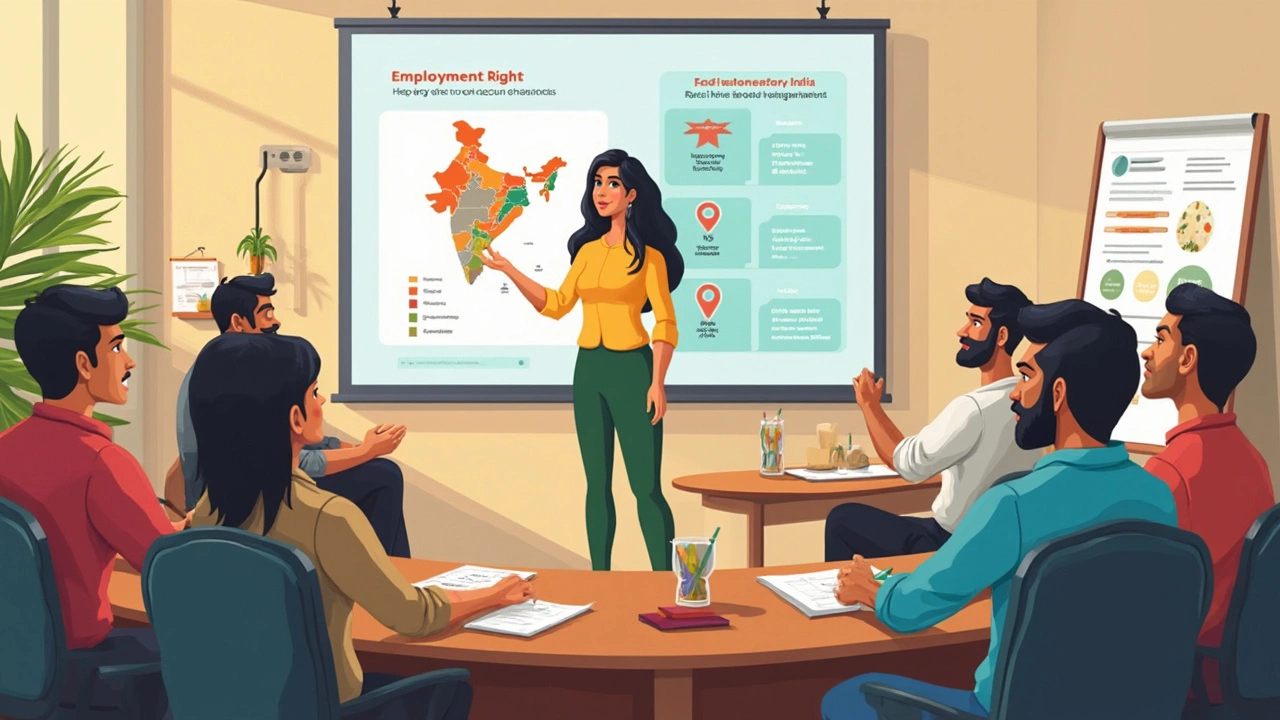Looking for work with a felony record? You’re not alone. Over 19 million Americans have a felony conviction, and landing a decent job can feel impossible—especially with government jobs. The truth is, some states make life a lot easier if you’ve made a mistake and want to move forward. You just need to know where to look and what to expect.
Right off the bat, states aren’t all built the same. Some make it nearly impossible for felons to get back on their feet, while others believe in second chances. If you’re thinking about moving or just want to understand your options, it’s smart to check which states actually give felons a fair shot, especially when preparing for stable government jobs.
Here’s where things get real: certain states passed 'Ban the Box' laws that stop employers from asking about your record on the first job application. Some states also have expungement programs, meaning you could wipe the slate clean and apply for jobs as if your past convictions never even happened. But let’s be clear—it’s a mixed bag depending on where you are. Want to know which places offer real hope and which still throw up brick walls? Buckle up, the details matter, and knowing them can save you years of frustration.
- What Makes a State Felon Friendly?
- States Leading the Way for Felons
- Government Job Options and Challenges
- Tips for Felons Navigating State Rules
What Makes a State Felon Friendly?
When you hear people talk about “felon friendly” states, they’re usually talking about places where folks with a record can actually get a shot at rebuilding their lives. This doesn’t just mean being able to rent an apartment or vote—though both matter—a felon friendly state gives you a real chance to land a decent job, especially in government, and get your life back on track.
Here’s what really sets these states apart:
- Ban the Box Laws: These laws stop employers from asking about your criminal history on the first job application. Instead, they can only ask later, usually after an interview. This way, you get judged on your skills—not your past.
- Expungement and Record Sealing: States with these policies let you legally erase or hide certain past convictions. Once that’s done, many employers and landlords won’t see it at all. In some states, after a few years with no trouble, you could be treated as if that felony never happened.
- Restoration of Civil Rights: Some states restore voting rights, the ability to serve on a jury, or even gun rights after you finish your sentence. This isn’t about jobs directly, but it helps you get fully back into society.
- Government Job Access: A few states don’t automatically block all felons from public sector jobs. They look at each person and the job itself, not just the label on your record.
- Licensing Access: If you want to work as a barber, nurse, or in any trade that needs a license, some states put fewer hurdles in your way if you have a record.
The rules and protections can change depending on what you did, how long ago it happened, and what you want to do. If you want a snapshot of how things stack up, check this out:
| State | Ban the Box for Public Jobs | Automatic Expungement | Voting Rights Restored After Sentence | Felon Friendly Licensing |
|---|---|---|---|---|
| California | Yes | Yes | Yes | Strong |
| Texas | No | Limited | No | Moderate |
| Illinois | Yes | Yes | Yes | Strong |
| Florida | No | No | Partial | Weak |
| Oregon | Yes | Yes | Yes | Strong |
Bottom line? A state is “felon friendly” when you actually have a path forward—whether it’s a government job, a skilled trade, or just feeling like you belong again. Each of these factors, alone or in combination, can make or break your shot at a fresh start.
States Leading the Way for Felons
If you’re serious about getting a second chance, some states just pull ahead—plain and simple. They’ve actually changed laws or created programs that give people with a record a fighting shot at a real job. The big idea: not all hope is lost, but you’ve got to know where to look.
Let’s talk specifics. Felon friendly states usually have three big things working in your favor: fair-chance hiring laws, realistic expungement or record-sealing rules, and a lower number of job bans for folks with a past.
- California: This state banned the box for both public and private jobs. Plus, it’s got one of the country’s strongest record expungement laws, especially since Prop 47 rolled out. If the offense is non-violent, wiping your record is a real possibility.
- Illinois: Not only is there a Ban the Box law for private and government work, but certain felonies can be sealed (which is rare elsewhere). Plus, Cook County has programs just for ex-offenders.
- Minnesota: It banned the felony checkbox for all public jobs back in 2009 and extended this to private employers since 2014. Its Workforce Development programs are tailored for second-chancers too.
- New York: Sealing and expungement got way easier in 2017. And as long as the job’s not sensitive (think: schools, police), the state makes sure you’re not tossed out for your past by default.
- Texas: They’ve got a lot of government jobs that only check your record if you make it past the interview. Plus, new laws let some folks get record relief without massive court battles.
Just to make it clearer, check out this quick breakdown of what some top states offer:
| State | Ban the Box | Expungement/Sealing | Govt. Job Access |
|---|---|---|---|
| California | Yes (public & private) | Strong | High |
| Illinois | Yes | Moderate | Good |
| Minnesota | Yes (all) | Moderate | Good |
| New York | Yes | Strong | Good |
| Texas | Partial | Moderate | Moderate |
If you look at the stats, over 33 states now have some form of Ban the Box law, but only a few actually enforce it well or link it to expungement help. Your best odds? Head for states putting money and effort behind giving people a real shot at work instead of just passing a law and calling it a day.
Bottom line: If you want to move or apply where you won’t be judged forever, check these states out first. It’s not perfect, but your chances are way better in these places than just about anywhere else.

Government Job Options and Challenges
You’ve probably heard government jobs offer good benefits and stability. But if you have a felony, it’s way more complicated. While federal jobs are tough to get with a record—especially if your conviction is related to the job (like a theft charge for a banking role)—state and local government jobs can have very different rules. Where you live matters a lot.
Let’s get straight to the facts. Some states like California and Minnesota have rolled out fair chance hiring laws for public workers. This means state agencies can’t ask about your felony record on the initial job application. Instead, they’ll look at your experience first—criminal background checks come later, only after you’ve proved you might be a good fit.
But here’s the catch: not all government jobs are open to everyone. Certain roles like police officers, corrections, and positions that handle sensitive data or money often block people with felony histories outright. Teachers and school bus drivers usually face strict barriers too, thanks to laws about working with minors.
To make it super clear, here’s a quick comparison of states and their approaches to hiring felons in government jobs:
| State | Ban the Box? | Expungement Option? | Notes on Government Job Access |
|---|---|---|---|
| California | Yes (All employers, public & private) | Yes | Jobs evaluated case by case after interviews |
| Minnesota | Yes (Public jobs only) | Yes | Many state jobs open but schools & law enforcement off limits |
| Texas | No (Public jobs can ask up front) | Limited | State agencies have some discretion |
| Georgia | Yes (Public only) | Some options | Public jobs possible, but strong background checks |
| Florida | No | Very limited | Most government jobs not available to felons |
You need to know, even in felon friendly states, having your record sealed or expunged makes a huge difference. For example, in Illinois, expunging your record can open the door to state and even some federal jobs. Plus, with more states joining the "Ban the Box" crowd, first impressions are starting to matter more than past mistakes—at least for the first part of the application process.
Like anything else that matters, you need to come prepared. Gather your court paperwork, proof of rehabilitation, or letters of recommendation. Some agencies offer special programs or second-chance hiring pipelines, so look those up in the state where you’re applying. If you do hit a wall, don’t get discouraged. Some cities (like Los Angeles and New York) have even friendlier policies than their states do.
Tips for Felons Navigating State Rules
Getting past your record and into a solid job means you need to know the rules where you live, or where you plan to move. One state might let you try again without making you jump through hoops, while others keep throwing up roadblocks. Here’s what can actually help you cut through the mess.
- Felon friendly states usually have 'Ban the Box' laws. For example, California and Minnesota stop employers from asking about felonies on job applications for state jobs. In Hawaii, this applies to private jobs too.
- Don’t ignore expungement or record-sealing. In Oklahoma and Illinois, you might qualify to seal certain felonies after a waiting period and finishing your sentence. Check your state's process—Texas makes this really tough, while Utah is making it much easier thanks to their 'Clean Slate' law from 2022.
- Use resources built for you. States like Michigan and Colorado have reentry programs that connect you to job training, legal help, and employers who care about second chances.
- Check government websites and local nonprofits. Indiana’s Department of Workforce Development, for example, lists jobs friendly to people with a record and also legal aid options for your background issues.
Some jobs stay off-limits, usually if they involve kids, law enforcement, or sensitive data. But even those bans aren't always set in stone—states are slowly changing what’s possible if you’ve put the past behind you.
| State | Ban the Box for Government Jobs | Felony Expungement Option | Active State Programs |
|---|---|---|---|
| California | Yes | Yes | Prison to Employment Initiative |
| Michigan | Yes | Yes | Nation’s largest Clean Slate Law (2023) |
| Utah | Yes | Yes, automatic in some cases | Clean Slate Utah |
| Texas | No | Some, but strict | Workforce Solutions Reentry |
| Illinois | Yes | Yes | Illinois Re-Entry Employment Service |
Biggest tip? Always read the current state rules and try free legal aid if there’s confusion—laws change fast, especially since 2020. Stack the odds for yourself and ask for proof about hiring rules instead of just guessing. Some felons have scored jobs after challenging a background check when the law was on their side. You could, too.





Write a comment